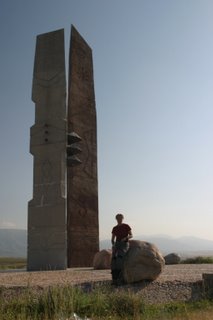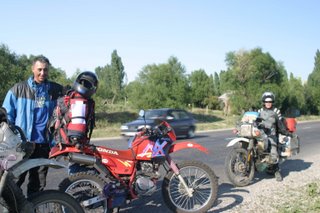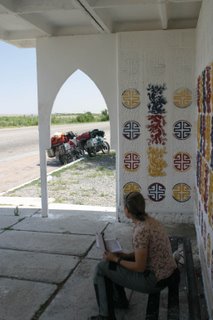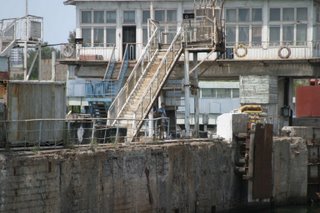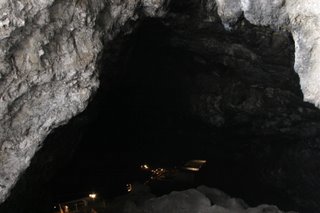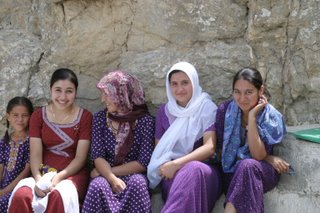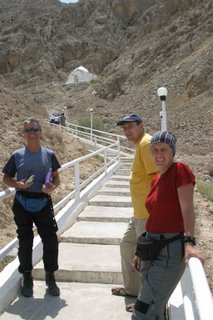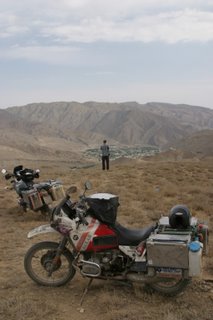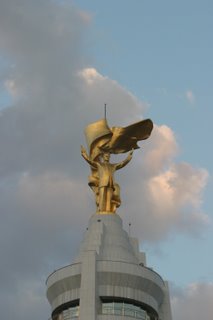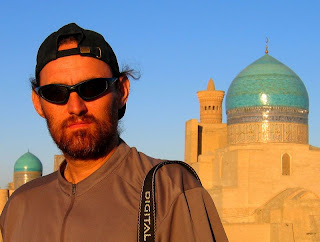
[One of our first views of Mongolia]
Unbelievable, these are actually getting shorter, and we are catching up.
This entry covers our trip from Mongolia to Russia, Kazakhstan, Kyrgyzstan, China and ending here in Pakistan shortly before we take off to India. Enjoy (or have a nice snooze!!)
From Novosibirsk we headed toward the border of Mongolia at Tashanta in the Altai region of eastern Russia. Shortly after passing Barnaul the country started getting much more interesting than previously. First, it started going along a large river, second, this is where everyone from this part of the country comes on the weekends. There is mountain climbing, river rafting, and plenty of trails for mountain bikes and walking (at least based on all the people with various signs we saw everywhere). As it was Sunday, there was a huge amount of traffic headed in the opposite direction, for which we were thankful. The further we rode into this huge river valley the nicer it became. We rode until dusk and then found a little side road and camped near a small brook, appropriated the campfire which was still smoldering and settled down for the night. The following day turned out to be more of the same. The river got wilder, and we caught an occasional glimpse of a raft floating down the river. At the end, it opens up into a wide plain around 70 km long which ends up at the border to Mongolia. Since it was late we chose to stay in the protected river valley as the wind had picked up and it looked like rain. So another night camping next to this beautiful river, life could be worse.
Finally, the next morning we got to the Russian border checkpoint, and although there were only two other people there we were told to wait. After an hour we were told they were closing for lunch and would resume work in 2 hours. (Note that in that hour no-one had come or gone into our out of the Russian immigration!!!) So we also settled down for lunch. Sure enough two hours later we were let into the compound to start our paperwork (to get out of Russia). The Russian side of the border (Tashanta) would turn out to be the most inefficient border crossing, though not the most complicated, this still belonged to the Turkmenistanis. While doing the paperwork, the heavens opened up and we had a torrential rain storm, luckily for us the Russians were so slow, or we would be getting wet outside. In the end we managed to fulfill all requirements to leave the country and were let go. We now rode 26 km or so to the outer Russian checkpoint, where someone else checked our passports again, before finally allowing out of the country. Next was the Mongolian immigration. The whole place was empty, and in around 15 minutes we were welcomed into Mongolia. Simple easy efficient, a real pleasure.

[Another "average" vista in Mongolia]
Mongolia did not disappoint. We had seen pictures, and they did not compare favorably. The vistas are huge, no roads, no signs, people so friendly it was scary. For example, we stopped a few kilometers inside Mongolia to put our papers away and get a drink, and a local bus (4x4 Russian van) stopped. Everyone got out, everyone shook our hands and welcomed us to Mongolia, thrusting babies in our arms!! The Mongolians like to look at everything with their hands, and this took a while to get used to. Everyone always alternatively smiling and shaking their heads at these huge bikes and riders. Lovely. Similar episodes would punctuate our whole stay in Mongolia.

[The Mongolians are a curious, hand-on bunch.]
Sitting here in Islamabad, trying to think of something about Mongolia which sounds good on paper is difficult. I have to say Mongolia is primarily a visual experience. For people used to cities and confined spaces I recommend they stay home. If Mongolia is anything it is a huge open space, punctuated here and there with small villages and occasional GER camps (Ger's are the Mongolian traditional tents, called Yurts in other places).

[One of the few traffic signs in Mongolia]

[Typical track choice, Mongolia]
There are no signs (almost), and no real roads anywhere outside the major agglomerations (of which there are only a few). So one basically just strikes out in the particular directions one wishes and if this track eventually goes over a pass it will converge with others as there is often only one that goes over the passes. On the other side, the paths will again diverge as everyone chooses a different way of crossing the wide plains separating the various mountains or hills. This goes on for thousands of kilometers! It took us 8 days to get from the border to Ulaan Bataar the capital. In this time the frame broke on Cecilia's bike twice, along with further breaks to the luggage racks of both bikes. All minor repairs by my standard. In the next settlement we would seek out a welder and he would then repair the broken part, the cost usually around 4-5$, and we would continue on our way.

[A Spaniard on a 4x4 quad racing across the Mongolian stepp, what a sight!]
The route we choose to take to Ulaan Bataar is known as the southern route, and basically is long, flat, and empty. There are no trees only huge low valleys, and plains, plenty of sheep, some camels, and horses (by the way we are at around 2000 meters for much of this part of the country). The track is lots of sand, corrugation, dust, and rocks, broken up by a few water crossings, and an occasional low pass or two. Day in day out same, same. Sounds boring, but it was really beautiful. One of the strangest things we came across was a 100 km or so outside of Ulaan Bataar, as we came over a rise, we were greeted by the sight of hundreds of Gers and tents, usually next to piles of rubble. This across the major "path" which went across the valley. Everyone was digging for gold!! They just set up their Gers and started digging, and this for an area of one square kilometer. Really strange. We had to detour around all the activity and continued on our way.
Ulaan Bataar was a very surreal experience, after all the empty spaces. It is a large city, with the accompanying traffic, noise and people. We had come here because we required a visa to re-enter Kazakhstan on our way south, the visa for Russia was multi-entry so that wasn't a problem, but Kazakhstan multi-entry visa was too costly and difficult to obtain. So we choose to do it this way. We also had a contact for a place to stay in Ulaan Bataar, and we were also expecting a packet sent from Switzerland with spare parts to come to that address.
We had a telephone number for our "contact", a certain Sabine, who runs a "biker guesthouse" in the capital. Well, as luck would have it, Cecilia's cell phone couldn't place calls here, so we tried by having a friendly bank teller call the number for us. The result was that the person on the other end said that Sabine was not there and would return in 10 days!! Unfortunately we didn't get to talk to the person on the other end, and the teller only said he didn't speak English anyway. We simply didn't get any further with her so we had to find another way. First we decided to check out some of the other guesthouses, all were full, or we couldn't find them. Then I bought a local SIM card for my mobile and we called the number again. The person really didn't speak very much English, but with a little effort we managed to confirm the address and we then had a taxi driver take us to the address in question.
This is where the fun begins, first near the address, I called again and the taxi driver spoke directly with the other party to get the correct directions. The address was quite a ways out of town, and for a while I was wondering what was going on. In the end we ended up in front of a gate with a little sign which showed it to be Sabine's guesthouse, and Oneway limited (a company name). So it seems we where in the right place (by the way the co-ordinates are "N 47° 52' 32.7", E 106° 49' 54.3", all co-ordinates will be posted on our web page when I do the update). I pay the taxi driver, he takes off. We honk our horns, knock on the gate, wait. Knock some more no answer. Eventually a lady comes walking by, opens the gate and lets us in. I follow her into the house, and there to my great surprise I find a gentleman passed out drunk on the floor, with a toddler in his arms! The woman, picks the baby up, kicks the guy a few times, he just turns over and continues to sleep. I feel like I am in the twilight zone! This can't be the guy I have been talking to (or trying to). So I call the number, sure enough someone else answers, and I explain that I am "Here". He says good, he will come by tomorrow! What? No, come by now, and straighten this mess out. I tried to explain that there is a drunk on the floor, the lady doesn't speak any English. So I hand the phone to the lady, she speaks with the guy for a few minutes and I get the phone back. No problem he says and hangs up. OK. This is getting better by the minute. Cecilia is still outside the gate waiting to see what is what.
The lady who let us in finds some keys and beckons me outside where she opens one of the Gers and shows me inside. OK, so we have a place to stay. I get Cecilia and we get our bikes inside and start unpacking. The lady asks if we want some food, so I said sure, and she runs off into the kitchen and prepares dinner, while Cecilia and I get unpacked and set up.
A half hour later a car pulls up and it is the guy on the phone. It turns out that he is a local fireman, and is on duty which is why he couldn't come before. He is a friend of Sabine's and therefore has her mobile. He says (it is a lot easier to communicate person to person), that she is gone. He doesn't know anything about the package we had sent here. He has to go back to work so he checks that everything is OK with the Ger and the food and then leaves. In the meanwhile the drunk is on his feet (barely), and speaks a few words of German to us, and disappears again. We have a dinner (some rice with meat and tea), and retire for the night.
The next morning there is no lady, no drunk, the baby is still there, but there are two young women taking care of it. They ask if we want breakfast and are promptly served fresh fried bread and butter, jam, eggs and tea on a nice sun terrace from which we have a nice view over the river which runs in front of Ulaan Bataar and the city in the background. The previous night seemed like a dream.
We end up staying nearly a week here, it is a terrible place to be if you have no transport, as it is around 14 km from the city center. But with the bike it is no problem. We get our visa, do some minor work on the bikes and relax for a few days before heading back toward the border to Russia. It has already been two weeks since we came into the country! While in UB we meet a German couple who are waiting for parts (we were able to pick our up at the TNT office in the city, no problem) from Germany. So for a few days we meet them for dinner every evening and swap travel stories.
We decide to take the northern route out of the country and so finally get on the road and head in that direction. The northern route turned out to be delightful. The tracks are better and there is a lot more scenery. Rivers, lakes, trees as well as the usual plains and plenty of empty spaces of course. As we were not in a hurry we spent a few days at a lake in northern Mongolia called Hovsgul Nuur. Absolutely gorgeous. Very difficult to get to, in particular the western side of the lake, but once there very relaxing and scenic. While camped there we were treated to some great Yak yogurt (add some sugar and jam) by a local from a nearby Ger.

[Camping on Lake Uureg Nuur in North West Mongolia]
Uureg Nuur another lake in the north western part of the country was also absolutely gorgeous, we almost couldn't tear ourselves away. But as life would have it, it started to get pretty chilly at night and even during the day the wind was blowing pretty cold from the north. It was time to head south.

[Internet stop in Oelgy, Western Mongolia]
In Olgy we picked up some supplies and did some things on the internet, and also ran into a troupe of Swedes coming from South Korea on their way to Sweden. They were on a Tran-Asia tour and were quite a sight to see. Around 8 bikes and 2 jeeps. We would run into them the following day again at the border, but on this day they were just wandering around Olgy looking for a hot shower. (Which they found in the local bathhouse). We headed toward the border and camped as near as we could, so that we could get an early start the following morning.
This is the same border we crossed previously and so were prepared for the slow pace. Unfortunately, as it was Monday (the border is closed on the weekend), there was more traffic that we anticipated. It took nearly an hour to get into the Mongolian immigration, which as previously was very efficient and quick, in 20 minutes we were on our way to the outer Russian border checkpoint. There things got slow very quick. As we parked, it became clear that the Russians had only let one or two of the vehicles go across that had come today (it was almost 10:30)so the rest were parked here. There was no movement one way or the other. Around 11:00 we were told that they were closing for lunch, so we had to wait until 14:00. At a quarter to 3 there still wasn't anything going on. Then the Swedes arrived, all at once. Together with the Swedes Cecilia managed to get the Russians to let us through, but not before they had turned all the Mongolians and Kazakhstanis away, so 20-30 cars and busses, many full of students going back to school in Kazakhstan all turned around and only the bikes and the two accompanying vehicles were allowed through for that day!! (4 Russian trucks had also been allowed through, but no other vehicles as long as we had been there, and only 2 had come in the opposite direction). The explanation was that there had been too many people coming through from the other side to process everyone!! Something which we were to find out wasn't the case. We all rode through and at the immigration stations (a brand new building, full of functionaries who didn't seem to busy as there was only 3-4 people there!!) we were given the full dose of bureaucracy, from having our vehicles disinfected, and having to purchase new insurance (our old one had lapsed). All of which took nearly two hours, including fighting about the fact that the insurance cost double what I had paid when coming in from Kazakhstan. But we finally got back into Russia, and headed straight for our last campsite here, which was just as pristine as we left it. The Swedes were behind us and as they were a large group it probably took them quite a while longer than us. But in the end it is remarkable how little they manage to get done at this border, whether by design or otherwise it is hard to tell, as the other two Russian borders were speedy by comparison.
Back in Russia, the plan was to go to Novosibirsk to pick up tires we had been able to order from BMW Moscow and were being shipped to the dealer in Novosibirsk. We took care of this, this time staying in a different hotel which was much nicer, but cost around the same. The tires where there and we took them to a local bike shop to get them mounted and continued on our way. As soon as we left the Altai region it had started to rain, and was cold, so we were riding in the rain to and from Novosibirsk, and very glad to be leaving this part of the world for hopefully warmer weather.
Kazakhstan didn't disappoint. As we neared the border, the weather cleared. The Russian and Kazakhstan immigration and customs were both efficient and relatively speedy and we were back in Kazakhstan. Same vistas, flat plains as far as the eye could see, but the weather was getting warmer. By the time we got to Almaty, all the cold weather gear had been stowed and we were back in our summer riding gear.
In Almaty we got a nice little apartment for a few days while I did some maintenance on the bikes. I also had to get some work done at the local bike shop, all of which was taken care of fairly quickly. This in addition to getting the visas we required for Kyrgyzstan and Pakistan, was all that we needed to do in Almaty, so we continued as soon as it was done.
As we headed for the Kyrgyzstan border we came across a very nice river valley where we camped for the night. The only time I can recall in Kazakhstan, that the landscape showed any "promise".

[River Canyon, Kazakhstan]
The following day (a Sunday) we crossed from Kazakhstan to Kyrgyzstan across what had to be the easiest least problematic border I have ever seen (barring none). Both sides took a total of 5 minutes, no customs docs, nothing, and there wasn't a soul there. This is the border between Kegen (Kaz) and Karakol (Kyr), so a very small and little used border post. As we approached I thought it might be closed, but a guard on each side took care of everything.
Kyrgyzstan turned out to be a real gem. Beautiful vistas, very friendly people, and some excellent (MC) roads. The first night we spent at the Karakol Tourist camp in a "traditional" (tourist) Kyrgyzstan yurt. Cute, but the camp was really nice. All around the vistas had one mountain higher than the other, all covered with snow. We spent the next couple of days making our way toward the Chinese border with a couple of side trips along Lake Issyk-Kul, and Song Köl, both very scenic areas. Lake Issyk-Kul is a major tourist attraction (at least during the soviet era, now mostly abandoned, but slowly being rediscovered by western tourists who mostly come here for the mountain trekking), not to mention that it was a testing ground for submarines during the cold war. Song Köl is way up, at 3000 meters a very high alpine lake. The northern shore nearly deserted, and perfect for some beautiful lakeside camping. To some extent we almost felt we were back in Mongolia. The vistas not quite as empty or large, but very similar.
We spent our last night in Kyrgyzstan in a real Yurt near the old Caravan fort of Tash Rabat near the border to China. This was also a stop on the silk road, and is situated in a narrow valley which if followed up will end up on a very high plain along the Chinese border. The family we stayed with was extremely hospitable and the yurt very comfortable. One day I hope to come back here and spend more time, but we have to get to the border as there will be a guide waiting for us on the other side.
The following morning we made our way to the border. Before the first checkpoint, my motorcycle celebrated a momentous occasion, it turned over 300,000 km, so I stopped and took a picture.
The border was un-eventful. The Kyrgyzstan side only had a small objection to the fact that we had no Fax as invitation to enter China. They are aware of regulations that foreigners with their own visitors require a guide on the Chinese side, and want to make sure that they don't have to re-process anyone that gets turned back. We showed them our e-mail invitation and they let us pass. At the top of the Torugart we had to wait around 40 minutes for the Chinese guide before being allowed to pass. The road up here (3700 m) was pretty bad as lots of Chinese trucks use this route. The Kyrgyzstan side isn't too scenic, when compared to say, Tash Rabat, but as soon as you get over the pass to the Chinese side, it gets very interesting. The mountains rise up dramatically on both sides, and the road is a lot steeper than on the Kyrgyzstan side. A few km later we stop at the first customs checkpoint on the Chinese side, here all our luggage is x-rayed. We then put the luggage in the guides car and continue along a very long, wide and wild. If the road had been better it would have been a really enjoyable ride, as it was we had to concentrate very hard on the road. Nevertheless it was a lot of fun.
At the bottom we finally hit the Chinese immigration point, where the Chinese were very efficient and friendly and it only took us 20 minutes or so to get through. We received new drivers licenses, and motorcycle papers, as well as license plates, all in Chinese. There were some additional customs formalities which our guide(s) took care of, we just waited outside, a real luxury.
From here we then drove the last 60 km to Kashgar where the guide dropped us off at a nice hotel and left.
We were now in China, OK maybe not quite, this is the Xianjing province, which is actually used to have a minority of Han people, until the central government started importing them en mass. Our guide admitted that he spoke practically no Chinese (Mandarin) and has to take courses. The people on the street are a mix of Kyrgyzstan, Mongolian, Chinese, Russian, a truly interesting mix. All as it should be for one of the greatest trading centers of the old (and new) silk roads. At the core though, it is a large city, with the few interesting things hidden away in the old town, or residential areas, which Cecilia took a quick look at. I simply enjoyed the ambiances of a very large, and varied mix of people.
After three days it was time to move on to Pakistan, with a quick stop at Karakul lake and in Tash Kurgan, where the Chinese immigration is. Compared to the lakes we had enjoyed in Mongolia and Kyrgyzstan, Karakul was just a tourist trap, not worth the effort or cost. Keep going and just around the corner is a group of Yurts, where you are welcomed to stay and are treated to a real authentic slice of life in this part of the world. The family simply vacates their Yurt and stays with the neighbors while you get to sleep in theirs. They feed you and you get to spend a few hours appreciating how hard and simple their lifestyle is. A real treat.
The following day, we headed to Tash Kurgan, via a little side trip. The Karakorum highway goes over a 4000 meter pass near a glacier, here it is possible to take a jeep track to where the glacier is coming down the side of the mountain. Something we decided to do. We made it up to around 4529 meters, where the jeep couldn't make it over a steep incline, and we decided it wasn't worth trying it on the bikes either. So we parked, and Cecilia and the guides walked the remaining 150 (vertical) meters to the face of the glacier at the bottom of the mountain!! Keep in mind the highest mountain in Europe is Mt. Blanc at around 4800 meters! Here the mountain started at that hight. The mountain in question was around 7700 meters, so it towered above where we were. Really spectacular. The bikes had very little power at this altitude, but they ran, with no modifications whatsoever. Dirty air filters, carburetors out of adjustment, valves not properly set. It is a real testament to German engineering that they didn't have any problems. My attitude was ride them 'till they drop, then I will fix whatever that is wrong. Luckily I didn't have to do anything.
We reached Tash Kurgan and settled in the hotel for the night, with a little side trip to a local welder to weld a broken box frame, a 5 minute job, costing a total of 1.50$. The following morning we went to the Chinese immigration and took care of the exit formalities. The efficiency and thoroughness, meant that it was very slow, but of course nothing compared to Tashanta or Turkmenistan! So after 3 1/2 hours we were on our way. No more Chinese license plates, but we got to keep our licenses and various other documentation as souvenirs. The actual border to Pakistan was another 200 km further on along the Karakorum Highway. The road here absolutely perfect, totally flat, and for the most part pretty straight, as it runs through a very wide valley floor toward the Kunjerab pass. Along the way we got to glimpse the famous K2 mountain just off to our port side (left) as we were climbing up to 4700 meters where the pass is. Luckily for us it was a beautiful day and we got a great look at all the mountains around us. After two more quick checkpoints we were at the top of Kunjerab and in Pakistan. The lone guard here is just for looks, as all the formalities are taken care of many km further down in the valley.
The Pakistan side was even more dramatic than the Chinese side of the Torugart pass, here the carved the road out of the side of the mountain, and it continually tried to reclaim its territory. An unbelievable feat of engineering, and than a couple of hundred kilometers long. Incredible, you could practically touch the other side of the valley. Lucky for us the road went down, down, down, if we had to come up this way, our bikes would have had a much harder time than on the Chinese side, which climbs very gradually.
On the Pakistani side, we were constantly passing Chinese work crews, we were to later find out that they are here to help Pakistan build a new two lane (or was it four lane) KKH. How they plan on doing that I don't know, but it will be interesting to see. Last year the KKH was blocked in more than 100 places, and this year it was blocked for more than a month due to heavy rains. So they really have their work cut out for them.
After clearing immigration and customs we proceeded to Passu where we had a good tip about camping at a place called Glacier Breeze Restaurant and Camp. It turned out to be better than even the most enthusiastic recommendations. We spent the next two days stuffing ourselves and getting a serious pampering from the staff. When we left the bill totaled 78.- Sfr for camping, dinner, breakfast, snacks, etc. over 4 days!! This included some of the best food we have had in a long time, highly recommended.
While here we ran into a group of Germans taking part in a guided overland tour from Germany. They were heading up the Karakorum to the summit, and then back toward Islamabad where they had been previously. The convoy included 4 all terrain trucks and 3 motorcycles, a very strange sight on the roads of Pakistan. We then headed to Karimabad where we spent a day checking out the Balti fort at the top of town, and some of the amazing water channels that have been cut into the side of the mountain to harness the water coming down from the mountain, miles away from the source. We also "discovered" the Hunza Cafe, and the Walnut cake (something which the Germans had told us about back in Passu), which is excellent. It should be it is based a Swiss recipe, namely the Engadiner nüsstorte!! This is not just idle boasting, the proprietor told us so. As part of a local help project, a Swiss development agency taught him how to make the cake, and run a small bookstore, and most important how to make a decent cappuccino! Now that is real development help!!
From Karimabad we continued on the KKH ran into our German friends at the Panorama hotel in Chilas. The following morning one decided to tag along with us to Bescham, the next stop along the KKH. We enjoyed wonderful weather, and the road continued to throw vistas at us, which just left us breathless. Every town we passed seemed more chaotic than the next, and the amount of colorful trucks we passed continued to increase. In Bescham we settled in at the Rana Inn, which filled up with these huge trucks later in the afternoon. The local population seemed to find it also very fascinating, as they camped outside and kept an eye on the happenings, now who was in a cage?
The following morning, we let the trucks and everyone leave while we had a leisurely breakfast and got on the road. More and more traffic, more and more towns, always larger than the previous greeted us as we made our way toward Islamabad. Then 20 km north of Manshera in the hills with some great curvy roads, albeit, very slippery and lots of truck traffic. Cecilia's bike slid out from under her when trying to avoid a truck which was in the wrong lane around a corner, and ended up broadsiding the truck. Luckily they were both going very slow and she didn't get hurt. The bike was another story. The front forks were bent, and bike was un-ridable. Again, as luck would have it, we had just passed the German trucks, and one had a trailer, so when they caught up with us a few minutes later, they offered to take the bike on the truck to Islamabad, which we gladly accepted. I bid farewell to the truck driver, no harm done, there was no point in getting into an argument, or getting the police. These guys have no money and there would have been a lot of hassle involved. We packed everything on the truck and Cecilia rode in one of the trucks and we continued. The rest of the ride was memorable only for the heavy traffic, lack of road rules, and the fact that my clutch cable snapped two kilometers from the campground. After ruining one spare cable, I managed to get the second one to fit, and made it to the campground just after the trucks overtook us again.
We set up and basically went to bed, it had been a pretty bad day all around, but in the end only the bike had gotten hurt and we were all thankful for that.
The following morning we decided to go an apply for our Indian visas first as this would take some time to process, during which I could get to work on the bike. So that is what we did. The procedure in Islamabad is pretty convoluted, but we managed. Basically, you have to go to the Coliseum and take a shuttle bus to the diplomatic compound, as they don't let you in any other way. All security measures are done before boarding the bus, no electronic gadgets, mobiles etc., all in all a pretty thorough check. We applied for our visas and then went to the bank to see about getting money. But by now it was near noon, and the ATM was empty, they advised us to come later or in the morning. We then headed back to the camping.
The following three days I spent taking the bike apart, and getting the parts fixed as well as could be done. I found a machine shop who was able to bend the forks back and in the end they were straight again. Also a number of additional parts had to be straightened. When I finally got everything done, and started to re-assemble the machine it turned out that the upper fork bridge was also damaged, so another day was wasted getting this fixed and installed again. By Sunday everything had been done and the bike was running again. A test ride showed that the handlebar was still a bit bent, but usable. The following day then we did another longer test ride and Cecilia declared that we could continue to Goa this way.
That brings us to the end of this "longish" blog entry. We are now set to continue our trip. We will pick up our visa and the following day head to Lahore, and then the border to India. In India we are planning on heading south as quickly as possible, leaving the sightseeing for after a month long beach vacation. During this "vacation" I will update our web page and add lots of more details of our trips to the journal as well as the usual section of goodies, pictures, tracks etc. Stay tuned.

[Mongolia]

[Mongolia]

[Mongolia]

[Ger Camp just outside Ulaan Bataar, Mongolia]

[Religious Cairn, Mongolia]

[Typical campsite, Mongolia]

[Some more Mongolian "motocycle" fans]




